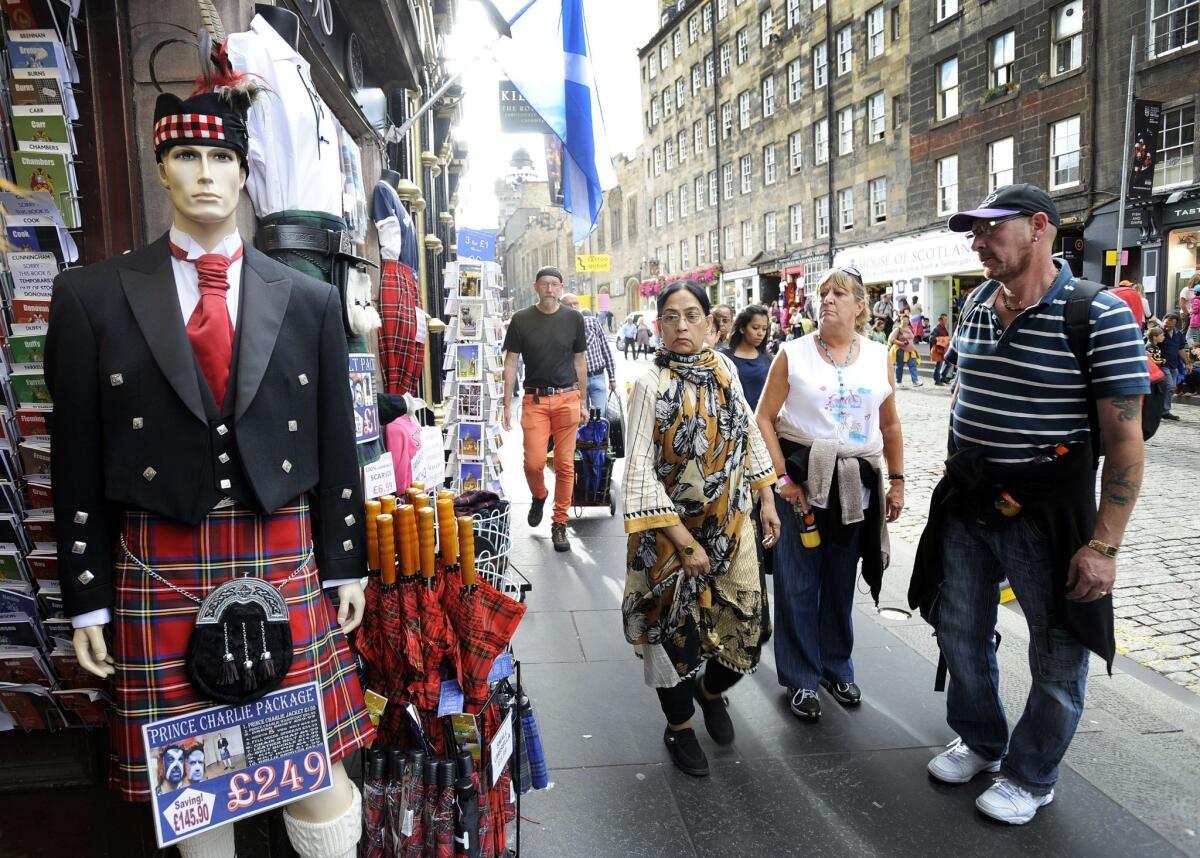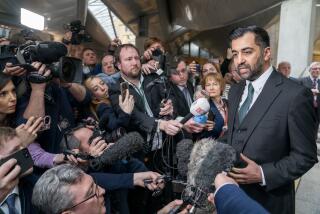Scottish independence referendum sparks debate about identity

LONDON – Exactly a year before Scotland decides whether to remain part of Great Britain or go it alone, supporters of independence clashed Wednesday with those who want to stay in the British fold, heralding 12 months of searching debate over fundamental notions of national identity.
Scottish voters go to the polls Sept. 18, 2014, in a historic referendum that could radically redraw the political map of the British Isles.
First Minister Alex Salmond, an ardent nationalist, said the time had come for Scotland to break away from England and Wales and claim sovereignty over weighty matters of state, from defense to education, without interference from the central British government in London.
“Independence is about giving ourselves the power to make our country as good as it can be,” Salmond told members of the semi-autonomous Scottish Parliament. “It’s about the right to decide, the ability to make these choices.”
But he was immediately lambasted by opposition lawmakers who accused him of sowing division, appealing to a reflexive nativism and misleading voters about the benefits – and costs – of independence.
“It’s because I’m a proud Scot, and not despite it, that I support Scotland remaining strong in the United Kingdom,” declared Johann Lamont, the leader of the Scottish Labor Party. “We are told we are different, our concerns and priorities are different from the rest of the United Kingdom, when we know that families across the United Kingdom are worried about jobs, their children’s education, their elderly parents’ care and about how to make the world a safer place. There is more that binds us together than will ever divide us.”
Organizing for and against independence has been underway since Salmond and Prime Minister David Cameron agreed in March on a date for Scottish voters to decide their political future. The campaign is expected to heat up now in the final 12 months before the plebiscite, especially the drive to win over residents who have yet to make up their minds.
The bigger challenge looms before independence activists: Polls consistently show that more Scots are in favor of preserving the 300-year-old union with England and Wales.
But Alistair Darling, a former British finance minister who is heading the “Better Together” campaign, warned against complacency before such a momentous ballot. Even the narrowest of victories for the other side would result in the biggest shake-up of the British Isles since Ireland achieved independence about a century ago.
“The nationalists only need to win once, by one vote, and that’s it – there’s no going back,” Darling told Sky News.
British officials in London have been trying to pile pressure on nationalists through a series of government reports detailing the disadvantages they say an independent Scotland would face.
With a population of just 5 million, its economy would struggle in a globalized world, anti-independence campaigners say. And because Salmond has pledged to keep the British pound, which is regulated by the Bank of England, it would be a paltry sort of independence if Scotland had no authority over its currency.
Salmond’s administration in Edinburgh, the Scottish capital, will issue its own studies later this year affirming independence as a viable and desirable option, particularly if Scotland gets full ownership of the oil deposits in the North Sea.
The Yes campaign is also expected to highlight the fact that, though Britain’s Conservative Party is barely a political force in Scotland nowadays, it rules the central government in London and thus imposes nationwide policies that most Scots detest. Salmond accuses the Conservatives of shredding the social safety net and pursuing a dangerously hawkish foreign policy.
“Independence is the best route, not just to becoming a more prosperous country, but to becoming a more just society,” Salmond said, adding that he was confident Scots would seize the opportunity for independence “with both hands.”
ALSO:
Israeli commander predicts that Assad will last for years
Anyone lose a $6.3-million winning lottery ticket in Spain?
Iran seesawing on social media, nuclear policy may reflect infighting
Twitter: @HenryHChu
More to Read
Sign up for Essential California
The most important California stories and recommendations in your inbox every morning.
You may occasionally receive promotional content from the Los Angeles Times.











